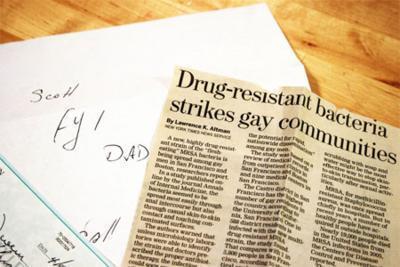 |
By Trevor |

"Flickr User TooHotty yesterday uploaded this photo to his account. He writes: "After 11 years of my dad never mentioning the word 'gay' or acknowledging the fact that I am, I got this in the mail. It's totally awkward, and came with a check. I hate to think that this is all he knows about my lifestyle.'" (Via Towleroad)
In Seattle, Chris Bartlett and I facilitated a workshop on how to resist lousy research. In particular, this was feeding off of earlier conversations on MRSA, the supervirus, etc. Here are 11 practical ideas we came up with to resist bad scholarship on Gay Men's Health:
1. Improve our understanding and ability to critique research methods, particularly the use of focus groups by prevention marketing agencies
2. Adding behavioral / identity questions to existing ongoing large-scale research projects
3. Form a National Gay Men's Health Community Advisory Board (CAB), where we would encourage researchers to voluntarily submit their work for critical feedback
4. Funding drives the agenda --> Influence funding's agenda
5. Develop a list of funding priorities for Gay Men's Health research
6. Start a Health Research Blog, where we could critique unethical / "bad" scholarship and praise "good" scholarship on GMH
7. Train doctors, researchers, and nurses while they're in school
8. Create national database of research abstracts, protocols (Wiki?)
9. Provide examples of good research, not just examples of bad
10. Form independent Gay Health Institute
11. Push for the funding of new and innovative prevention strategies, interventions, and organizations -- not just the same old, same old.
With the upcoming administration change, we in particular discussed the importance of #5, to influence the decisions in the coming few years about what priorities to set in regards to Gay Men's Health.
|
Hey Trevor,
Sorry I missed that workshop. Somehow I didn't know it was even happening [slaps hand]. Thanks for posting the 11 strategies.
I'd point you toward a great book called 'Research As Resistence: critical, indigenous and anti-oppressive aproaches' (2005, Toronto: Canadian Scholar's Press) edited by Leslie Brown and Susan Strega.
The chapters explore the many ways research continues to perpetuate the dominant Western science model, and offers innovative strategies for new kinds of research.
Worth a read. Let me know if you can't find a copy and I'll see if I can get one to you.
Mg
Sounds fascinating! I'll try to find a copy!!! Thanks, Marcus! xoxo